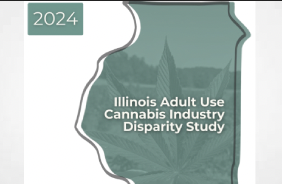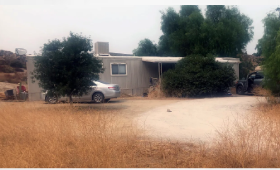2024 Nerevu Group, LLC, All Rights Reserved. i
The Study Team
Nerevu Group (pronounced {nay-RAY-voo}) is a data analytics firm that helps organizations uncover the insights hidden in their real-time data. With a focus on development, data intelligence, and data strategy, Nerevu ushers its clients into the data-driven future. By automating manual processes, simplifying business analytics, and integrating data silos, Nerevu empowers its clients to improve their operations and drive growth.
CW Financial and Management Group, is an Illinois-based service-disabled veteran-owned small business (SDVOSB). A State of Illinois’ Central Management Services Minority Owned Small Business, CWFM Group helps customers solve complex challenges and create the outcomes they desire. With expertise in accounting, budgeting, auditing, process design and improvement, healthcare administration, financial analytics, Supply Chain Management, and many other areas of administration, CWFM Group served as the project manager for the Illinois Adult Use Cannabis Industry Disparity Study.
The Dorsey Law Office, P.C. (DLO) is an Illinois-certified Business Enterprise Program MBE which concentrates its practice on providing government clientele with policy development and regulatory implication analysis. DLO assists both select public and private organizations with feasibility analysis, property retention, acquisition and conveyance, and relationship management services that facilitate clients’ goals and objectives. Through its principal, it is a part of the Illinois State Bar and is licensed in the Federal District Court of Central Illinois. With extensive experience, DLO provided the analysis instrumental to the accurate articulation of issues fundamental to the formulation and implementation of appropriate legal strategies.
Tanoma Consulting, LLC is a national consulting firm providing transformative culturally responsive research, evaluation, and capacity-building services to advance health, education, and workforce equity through a lens of racial justice and equity by emphasizing holistic, upstream, trauma-informed, and empathy-building. Led by Lisa Aponte-Soto, Ph.D., MHA, Tanoma’s disparity research team included Ana Herrera, Ph.D., MPH, Emely Medina-Rodríguez, Ph.D., MA, Mislael Valentín-Cortés, MPH, MSW, Ph.D., Maya Diaz, MA, Haley Beck, MA, Paola Torres, MPH, Riley Coesens, and Javier Arellano.
Applied Economics Clinic (AEC) is a mission-based non-profit consulting group offering expert services in the areas of energy, environment, consumer protection, and equity. AEC’s team, under the guidance of Elizabeth A. Stanton, Ph.D., included, Bryndis Woods, Ph.D., Tanya Stasio, Ph.D., Jordan Burt, Deja Garraway, Nayantara Biswas, and Alannah Shute.
Richard M. Juang, J.D., is an attorney with the Law Office of Richard M. Juang.
Jean Lacy is a policy expert, independent consultant, and the Founder of the Illinois Psychedelic Society, advocating for safe access and sensible, equitable drug policy in Illinois.
Acknowledgments
We wish to express special appreciation to Erin Johnson, Solomon Hatch, Kirsten Davis-Franklin, and Nathaniel Inglis Steinfeld and the staff at the Illinois Department of Financial & Professional Regulations, Illinois Department of Agriculture, and staff at the Illinois Department of Commerce and Economic Opportunity for their assistance in conducting this study. Additional thanks to Colette Holt. Most importantly, we would also like to thank the participants of the focus groups and the broader cannabis community for their invaluable contributions and dedication to furthering our research efforts.
EXECUTIVE SUMMARY
In June 2019, Illinois passed the Cannabis Regulation and Tax Act (CRTA) to provide benefits and business opportunities “to individuals most directly and adversely impacted by the enforcement of cannabis-related laws who are interested in starting cannabis business establishments.”1 Acknowledged by the Governor and General Assembly, the disproportionate impact of cannabis prohibition on racial and ethnic minoritized communities fueled the drafting of the CRTA and a policy to promote equity and investment in these communities.2 The race-neutral policy, known as social equity, included provisions for community reinvestment, funding and support for new entrants to the cannabis market, and expungement of criminal records related to cannabis possession up to certain amounts.3,4
1 Illinois General Assembly, “410 ILCS 705/7-1 Cannabis Regulation and Tax Act,” June 25, 2019, accessed November 17, 2023, https://www.ilga.gov/legislation/ilcs/ilcs5.asp?ActID=3992.
2 State of Illinois, “Gov. Pritzker Signs Most Equity-Centric Law in Nation to Legalize Adult-Use Cannabis,” June 25, 2019, accessed December 11, 2023, https://www.illinois.gov/news/press-release.20242.html.
3 Chapter III BACKGROUND provides a detailed history of the CRTA.
4 Chapter IV CANNABIS REGULATION IN ILLINOIS provides a detailed review of the CRTA’s social equity provisions.
The CRTA legalized adult use cannabis sales beginning at the start of 2020. By the end of 2022, the State of Illinois awarded over 550 adult use cannabis licenses to over 400 businesses, the majority of which were owned by women or racial and/or ethnic minorities.
Pursuant to the CRTA, the Cannabis Regulation Oversight Officer (CROO) selected Nerevu Group (Nerevu) to conduct a disparity study to evaluate “whether there exists discrimination in the State of Illinois’ cannabis industry” and if so, “evaluate the impact of such discrimination” and provide “recommendations for reducing or eliminating any identified barriers to entry in the cannabis market.”5
5 Illinois General Assembly, “410 ILCS 705/5-45(e) Cannabis Regulation and Tax Act,” June 25, 2019, accessed November 17, 2023, https://www.ilga.gov/legislation/ilcs/ilcs5.asp?ActID=3992.
We analyzed all five adult use cannabis license types—dispensing organizations, craft growers, infusing organizations, transporting organizations, and cultivation centers—across all licensing rounds within the study period of January 1, 2020, to January 31, 2023. This thorough analysis provided insights into the distribution and disparities within the cannabis industry’s licensing process in Illinois.
A. Legal Framework
As mandated by the CRTA, this disparity study conforms to the legal foundations established by the U.S. Supreme Court, which are outlined in federal guidelines and applied in previous State of Illinois disparity studies.6 Under the Equal Protection Clause of the Fourteenth Amendment to the U.S. Constitution, no state shall deny any person within its jurisdiction the equal protection of the laws. Generally, government policies must withstand “strict scrutiny” or “intermediate scrutiny” to
6 Chapter II DISPARITY STUDY LEGAL STANDARDS provides a detailed description of the legal framework applicable to the study.
ILLINOIS ADULT USE CANNABIS INDUSTRY DISPARITY STUDIES REPORT 2024
© 2024 Nerevu Group, LLC, All Rights Reserved. 2
survive constitutional challenges regarding race- or gender-based discrimination. In City of Richmond v. J.A. Croson Co., the Supreme Court outlined the “strict scrutiny” standard for reviewing race-based government policies, which requires a compelling government interest in adopting such a policy and a narrowly tailored remedy for furthering that government interest.7 Gender-based policies face an “intermediate scrutiny” analysis, demanding an exceedingly persuasive justification and substantial relationship between the policy and its objective.8 For this study, we employ a rigorous analysis akin to strict scrutiny for both race and gender aspects, ensuring a comprehensive examination of disparities and informing corrective measures within the Illinois cannabis industry. Additionally, we discuss rational basis scrutiny and its applicability to classifications, such as Social Equity Applicants (SEAs), that are unrelated to race, ethnicity, religion, national origin, or gender.
As further defined in Chapter II. DISPARITY STUDY LEGAL STANDARDS, it is crucial to distinguish between disparity and discrimination. Disparity refers to one or more quantifiable difference(s) between two or more defined groups.9 Within the context of this research, we examined disparities among different participant groups to ascertain whether the market composition accurately mirrors the diversity of ready, willing, and able market participants.10
Discrimination is the unjust or prejudicial treatment of people based on race, ethnicity, religious beliefs, military status, gender identity, etc.11 This includes systemic barriers, explicit policies, and the absence thereof, which can lead to unequal access to opportunities, services, systems, and resources, thereby producing a disparate impact, such as the inequitable distribution of licenses.12
In this study, we gathered extensive quantitative data from various sources—federal, state, and private. We then analyzed the demographics of the Illinois cannabis and related industries and identified disparities by race, ethnicity, and/or gender in the Illinois cannabis industry relative to suitable comparison groups. We complemented this analysis with qualitative data from 200 industry leaders, cannabis licensees, and cannabis license applicants who participated in a series of interviews and focus groups.
We also analyzed survey results from cannabis licensees and applicants to identify whether disparities were the result of discrimination. The analysis incorporates over 200 survey responses from the 2023 CROO Diversity Survey and a separate cannabis applicant survey, totaling 216 responses. Overall, the data from the CROO Survey involved 156 responses, while the Nerevu Survey included 60 responses, each contributing to a comprehensive overview of the cannabis industry as of 2023.
1720877137166


















